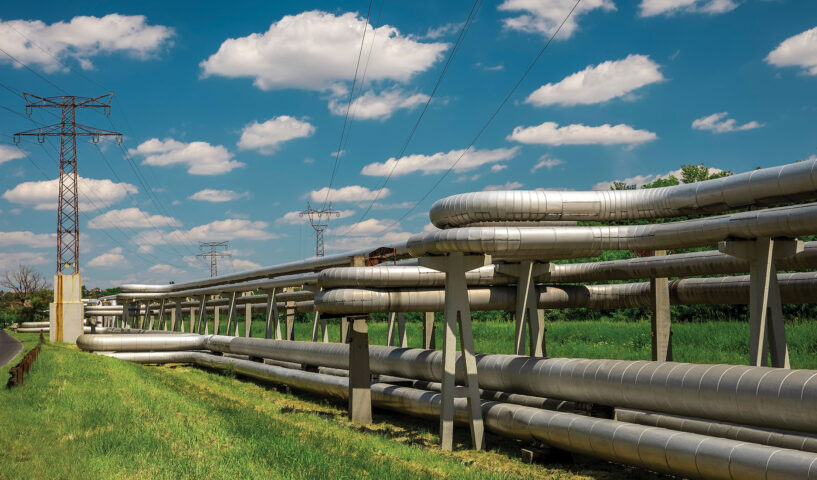
Powering change: Ireland’s clean energy future
13th October 2025
The Trump effect
13th October 2025District heating bill approved

The General Scheme of the Heat (Networks and Miscellaneous Provisions) Bill 2024, approved in October 2024, aims to provide a legislative framework to enable the rollout of district heating systems in the State, support the growth of an effective low-carbon district heating industry, and provide price protection for consumers.
The Bill seeks to establish a Heat Network Authority tasked with providing a centralised approach to the strategic development of the district heating sector throughout the State. The Bill designates the Sustainable Energy Authority of Ireland (SEAI) as the Authority, with corporate governance oversight provided by the Department for Climate, Energy and the Environment (DCEE).
It also seeks to establish a National District Heating Centre of Excellence within SEAI which will aim to ensure balanced and timely delivery of district heating networks and centralise sector developments.
The Bill aims to provide for long-term state ownership of district heating infrastructure. This aspect of the Bill was designed with the aim to ensure the district heating sector is developed on a state-wide basis under central direction. It is intended that a single state entity or utility will oversee the development and expansion of networks.
Upon publication of the Bill, the Department indicated that the Infrastructure, Climate and Nature Fund (ICNF) would be used for the development of district heating infrastructure. The ICNF was established in 2024 to manage windfall capital tax receipts to alleviate future expenditure objectives pressures, with an aim to invest in the transition to climate neutrality. Up to €3.15 billion in the ICNF is being allocated to the multi-annual funding of designated environmental projects from 2026 to 2030.
In July 2025, DCEE allocated €5 million from the Climate Action Fund (CAF) to support pre-construction development costs for efficient district heating projects in the State. DCEE also announced that it is seeking a multi-annual financial allocation for the construction of efficient district heating projects over the period 2026 to 2030.
A district heat network funded by the CAF and developed by South Dublin County Council in Tallaght opened in April 2023. It uses waste heat from the Amazon Data Centre, with plans in place to use waste heat from the Poolbeg incinerator to provide heat to nearby buildings.
Climate targets
District heating in the State is currently regulated by the assignment of functions under the EU’s (Renewable Energy) Regulations 2022. The Bill’s creation was a recommendation outlined by the 2023 report of the District Heating Steering Group which was established in line with a target contained in Climate Action Plan 2021. Climate Action Plan 2024 subsequently set a commitment to the drafting of legislation to provide a regulatory model for district heating.
The State has a district heating share of less than 1 per cent, one of the lowest in the EU. Climate Action Plan 2023 sets a target to deliver up to 2.7 TWh of district heating by 2030, with up to 0.8 TWh by 2025.
District heating systems are identified as key to achieving a 12 per cent share in energy from renewable sources for heating and cooling (RES-H). The State’s RES-H was 7.2 per cent in 2023, according to the SEAI’s Renewable Energy in Ireland report. This is far below the 2023 EU average of 26.2 per cent recorded by Eurostat.
The Bill is also aimed at contributing to the State’s sectoral emissions targets for the built environment, which set a ceiling of 36 MtCO2eq for the period of 2021-2025, and 28 MtCO2eq for 2026-30. These targets will be missed, even with the implementation of additional measures, according to the EPA’s May 2025 report, Ireland’s Greenhouse Gas Emissions Projections 2024-2055. It projects that the built environment will have produce 36.1 MtCO2eq in 2021-2025 and 33.8 MtCO2eq in 2026-2030.
The SEAI’s National Heat Study, published in February 2022, identified the potential for district heating to supply 50 per cent of heat to buildings in the State, particularly in large towns and cities. Codema, Dublin’s Energy Agency, states that district heating could be used to meet approximately 80 per cent of heat in Dublin by 2050 and 54 per cent of heat demand in the State.
Upon approval of the Bill in 2024, then-Minister Eamon Ryan said: “By approving the General Scheme of this bill, the Government is recognising that district heating has the potential to make a lasting contribution to Ireland’s heat needs and climate goals.
“District heating has the potential to heat entire towns, reducing costs for consumers and helping us lower our emissions.”
